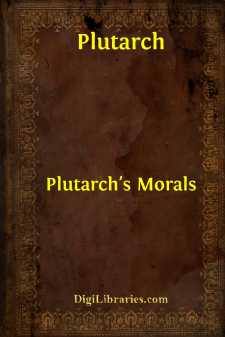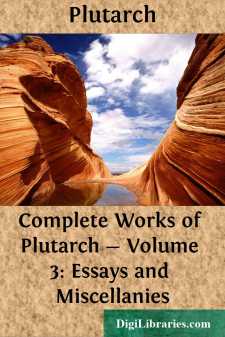Categories
- Antiques & Collectibles 13
- Architecture 36
- Art 48
- Bibles 22
- Biography & Autobiography 815
- Body, Mind & Spirit 144
- Business & Economics 28
- Children's Books 18
- Children's Fiction 14
- Computers 4
- Cooking 94
- Crafts & Hobbies 4
- Drama 346
- Education 58
- Family & Relationships 59
- Fiction 11834
- Games 19
- Gardening 17
- Health & Fitness 34
- History 1378
- House & Home 1
- Humor 147
- Juvenile Fiction 1873
- Juvenile Nonfiction 202
- Language Arts & Disciplines 89
- Law 16
- Literary Collections 686
- Literary Criticism 179
- Mathematics 13
- Medical 41
- Music 40
- Nature 179
- Non-Classifiable 1768
- Performing Arts 7
- Periodicals 1453
- Philosophy 65
- Photography 2
- Poetry 896
- Political Science 203
- Psychology 44
- Reference 154
- Religion 515
- Science 126
- Self-Help 85
- Social Science 83
- Sports & Recreation 34
- Study Aids 3
- Technology & Engineering 59
- Transportation 23
- Travel 463
- True Crime 29
Plutarch
Plutarch was a Greek biographer, essayist, and moralist, best known for his work "Parallel Lives," a series of biographies comparing famous Greeks and Romans. Born in Chaeronea, Greece, around 46 AD, he was a philosopher who combined ethical philosophy with historical narratives. His other major work, "Moralia," is a collection of essays and dialogues covering various moral, religious, and philosophical topics. Plutarch's writings had a significant influence on later European literature, particularly during the Renaissance.
Author's Books:
Sort by:
by:
Plutarch
THESEUS As geographers crowd into the edges of their maps parts of the world which they do not know about, adding notes in the margin to the effect that beyond this lies nothing but sandy deserts full of wild beasts, unapproachable bogs, Seythian ice, or frozen sea, so, in this great work of mine, in which I have compared the lives of the greatest men with one another, after passing through those...
more...
by:
Plutarch
§ i. Come let us consider what one might say on the education of free children, and by what training they would become good citizens. § ii. It is perhaps best to begin with birth: I would therefore warn those who desire to be fathers of notable sons, not to form connections with any kind of women, such as courtesans or mistresses: for those who either on the father or mother's side are ill-born...
more...
by:
Plutarch
Epicurus's great confidant and familiar, Colotes, set forth a book with this title to it, that according to the tenets of the other philosophers it is impossible to live. Now what occurred to me then to say against him, in the defence of those philosophers, hath been already put into writing by me. But since upon breaking up of our lecture several things have happened to be spoken afterwards in...
more...




